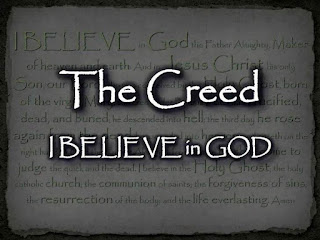[Jesus said] “But in those days, after that tribulation, the sun will be darkened,
and the moon will not give its light, and the stars will be falling from
heaven, and the powers in the heavens will be shaken. And then they will see the
Son of Man coming in clouds with great power and glory. And then he will send
out the angels and gather his elect from the four winds, from the ends of the
earth to the ends of heaven.” (Mark 13:24-27 ESV).
The details about Jesus’ second coming are mysterious, and there are differing interpretations of some of the Bible’s statements about end times and the return of Christ. But in teaching about Christ’s return, the Apostles’ Creed simply states this bold biblical truth: “He will come to judge the living and the dead.” Someday Jesus will return from heaven. He didn’t say when this will be, but he did say that he will return “with great power and glory” for all to see. Jesus’ coming again will be a day of great joy for all his followers, who have been redeemed through his sacrifice on the cross. For them the whole curse of death and hell has been removed (cf. Romans 8).
But
Jesus’ return will also be a day of great trembling because, as the Bible
warns, he will judge once and for all the people who have rejected him. Though
believers in Christ may not agree on all the details of his return, we
certainly can agree on this fundamental of the faith. It is both an
acknowledgement of our hope and a call to service.
I want
to be very clear. The call is not a prerequisite upon which our fate is
determined (cf. Ephesians 2:8-10); however, it is a strong call for us to
follow him faithfully, dying daily to ourselves so that we can walk in step
with his Spirit, using our gifts for God’s glory and bearing fruit in his name
(cf. John 15:1-17; Galatians 5:22-26). This involves showing God’s love to
everyone and sharing his desire that everyone believe in him. It is not a call of
what we must do; it is a call of what we get to do!




















